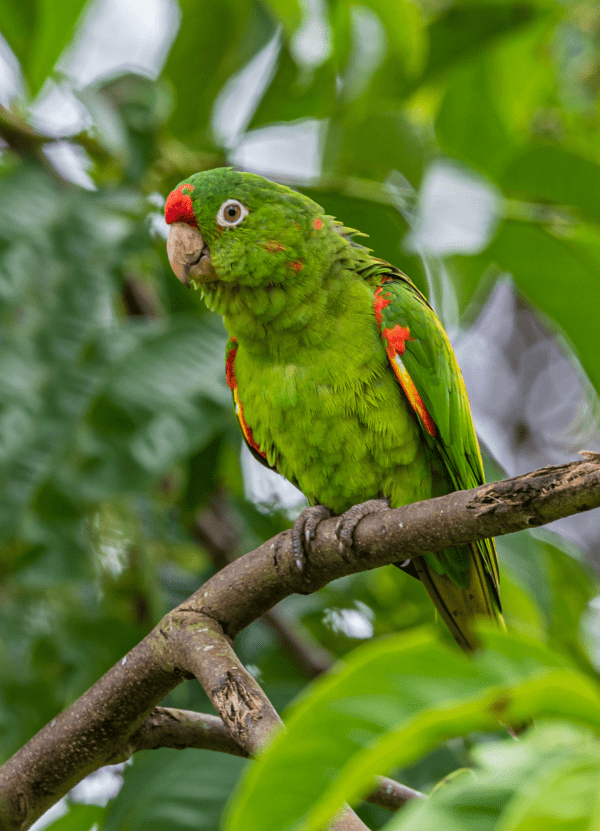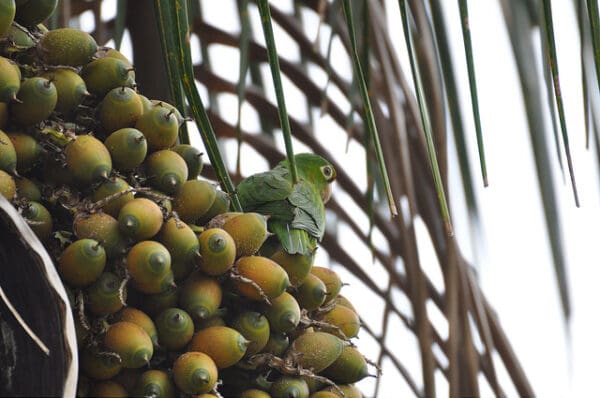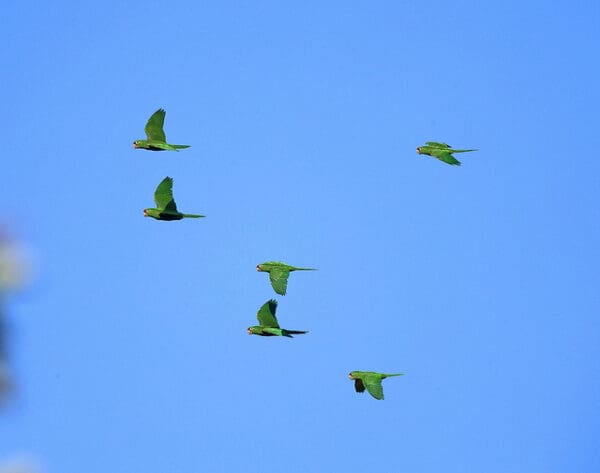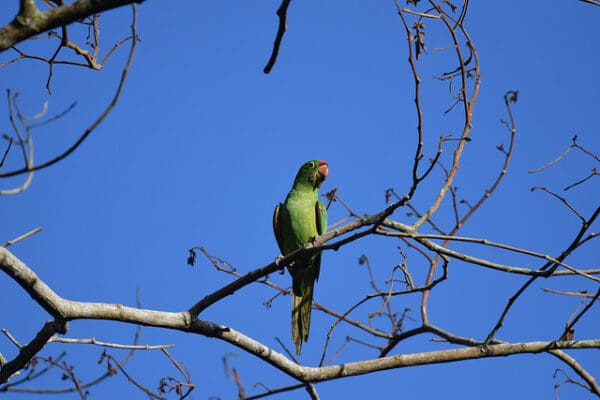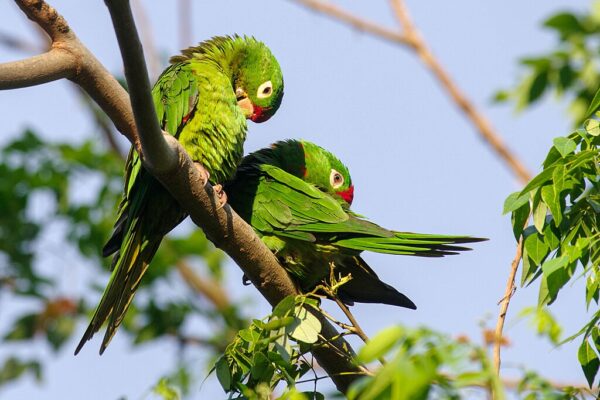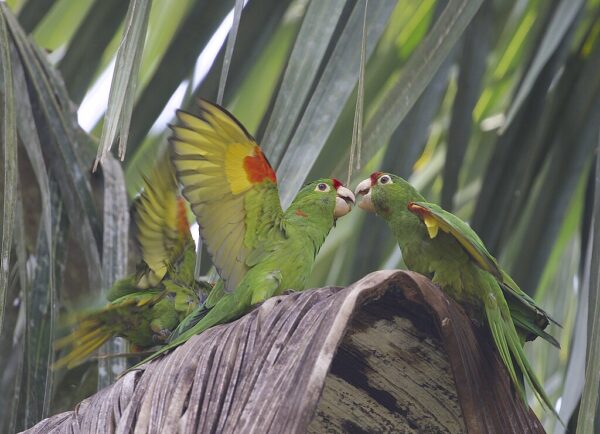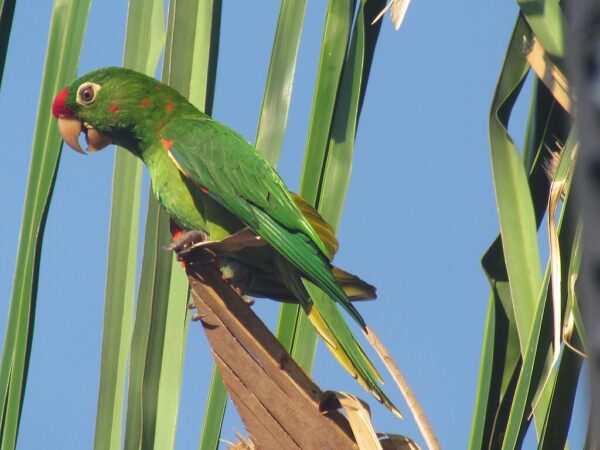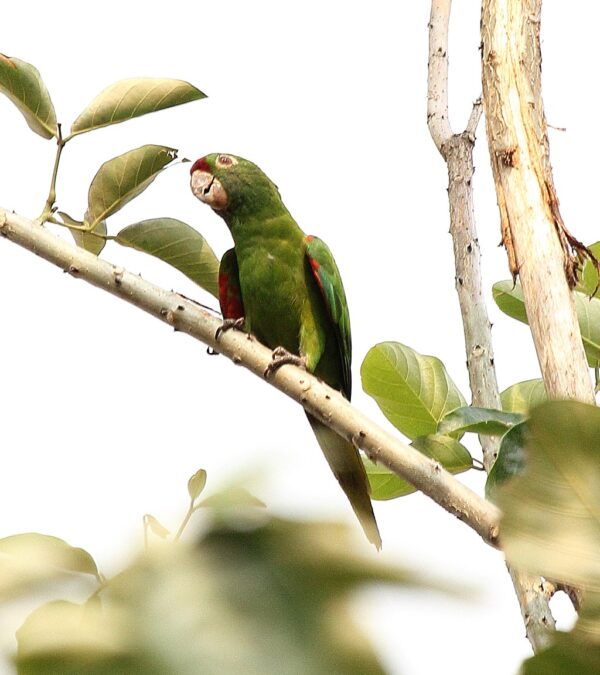Finsch’s Conure
Also known as:
Crimson-fronted Parakeet or Conure
Also known as:
Crimson-fronted Parakeet or Conure
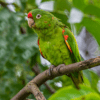
![© Amaury Laporte [CC BY-SA 2.0] via Flickr A wild Finsch's Conure forages on fruit](https://parrots.org/wp-content/uploads/2023/01/wpt_Finschs-Conure_1315-13-100x100.jpg)
![© Tom Murray [CC BY-NC-SA 2.0] via Flickr Wild Finsch's Conures flock in the skies](https://parrots.org/wp-content/uploads/2023/01/wpt_Finschs-Conure_1315-12-100x100.jpg)
![© Andy Reago and Chrissy McClarren [CC BY-NC-SA 2.0] via Flickr A wild Finsch's Conure perches on a branch](https://parrots.org/wp-content/uploads/2023/01/wpt_Finschs-Conure_1315-11-100x100.jpg)
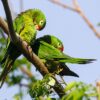
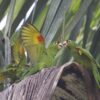
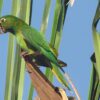
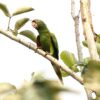
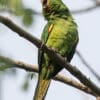
DID YOU KNOW?
Finsch’s Conures are loyal to their roost sites, but any kind of disturbance causes the birds to completely abandon them. Hundreds of birds then need to find a new roosting area.

Psittacara

finschi
Size:
28 cm (10.9 in)
Weight:
135-175 g (4.7-6.1 oz)
Subspecies including nominate:
one
Colour Adult:
Both adults in general yellow/green; red forehead and forecrown; sometimes a few scattered red feathers on neck; red bend of wing, carpal edge and outer lesser underwing coverts, occasionally tinted with orange; yellow outer greater underwing coverts; green inner underwing coverts; variable red markings on thighs. Beak horn-coloured. Eye ring bare and buff/white. Eye orange.
Colour Juvenile:
As in adults but red on forehead and forecrown minimal or absent; dull olive outer greater underwing coverts; red on thighs absent. Eye grey.
Call:
Calls in flight are loud and raucous; also higher pitched whistles, squawks and chattering sounds. Nighttime at roosting site calls are loud, harsh and gutteral. Some nighttime calls more elaborate and song-like.
More Information:
Content Sources:
CITES
Parrot and Conure World
BirdLife International
Cornell Lab of Ornithology/Birds of the World
Parrots: A Guide to Parrots of the World, Juniper and Parr, 1998
Parrots of the World, Forshaw, 2006. 2010 edition
Parrots in Aviculture, Low, 1992.
Psittacine Aviculture, Schubot, Clubb and Clubb, 1992.
Captive Status:
Fairly common in US, less so elsewhere.
Longevity:
15-20 yrs
Housing:
Aviary or suspended enclosure, minimum length 2-3 m (6.5-9.8 ft). Provide roosting/nest box.
Diet:
Fruit such as: apple, pear, orange, banana, cactus fruits, pomegranate, forming about 30 percent of diet; vegetables such as: carrot, celery, green beans and peas in the pod; fresh corn; green leaves such as: Swiss chard, lettuce, sowthistle, dandelion, chickweed; spray millet; small seed mix such as: canary, millet, and smaller amounts of oats, buckwheat and safflower; soaked and sprouted sunflower seed; cooked beans and pulses; boiled maize and complete pellet.
Enrichment:
Provide overhead misters or fresh water daily for bathing. Provide bird-safe branches, wood toys, heat sterilized pine cones, puzzle and foraging toys, ladders, swings.
Nest Box Size:
Vertical box 12″ x 12″ x 18″ (30.5 cm x 30.5 cm x 46 cm).
Clutch Size:
3-4
Fledging Age:
8 weeks
Hatch Weight:
—
Peak Weight:
—
Weaning Weight:
—
World Population:
500,000-5,000,000 mature individuals, stable.
IUCN Red List Status:
Least Concern
CITES Listing:
Appendix II
Threat Summary:
Not globally threatened. Abundant on the Caribbean slope of Nicaragua. Common and widespread in deforested areas throughout Caribbean slope of Costa Rica, in the Central Valley and S Pacific. Locally common and spreading east in Panama. Uncommon in international trade.
Range:
Occurs in southern C America, from SW Nicaragua to Costa Rica, throughout Caribbean slope. Regular visitor to Guanacaste and on southern Pacific slope and east to Azuero Peninsula, W Panama.
Habitat:
Found up to 1400 m (4592 ft) in tropical and subtropical zones in Costa Rica and up to 1650 m (5412 ft) in lightly wooded or open country with isolated trees, secondary growth, woodland edge, coffee plantations and other agricultural lands in W Panama.
Wild Diet:
Feeds on flowers and fruits of Erythrina and Inga, fruits of Croton, Zanthoxylum and Ficus and grain such as sorghum and maize.
Ecology and Behaviour:
Social, seen generally in groups of up to 30 individuals. Larger flocks of several hundred gather at communal roosts in tops of trees or palms.
Clutch and Egg Size:
3-4 eggs
Breeding Season:
July, Panama; December–May, Costa Rica. Nest is often old palm stub cavity; may excavate hole in rotten wood or base of epiphyte.
Related Links:
—
